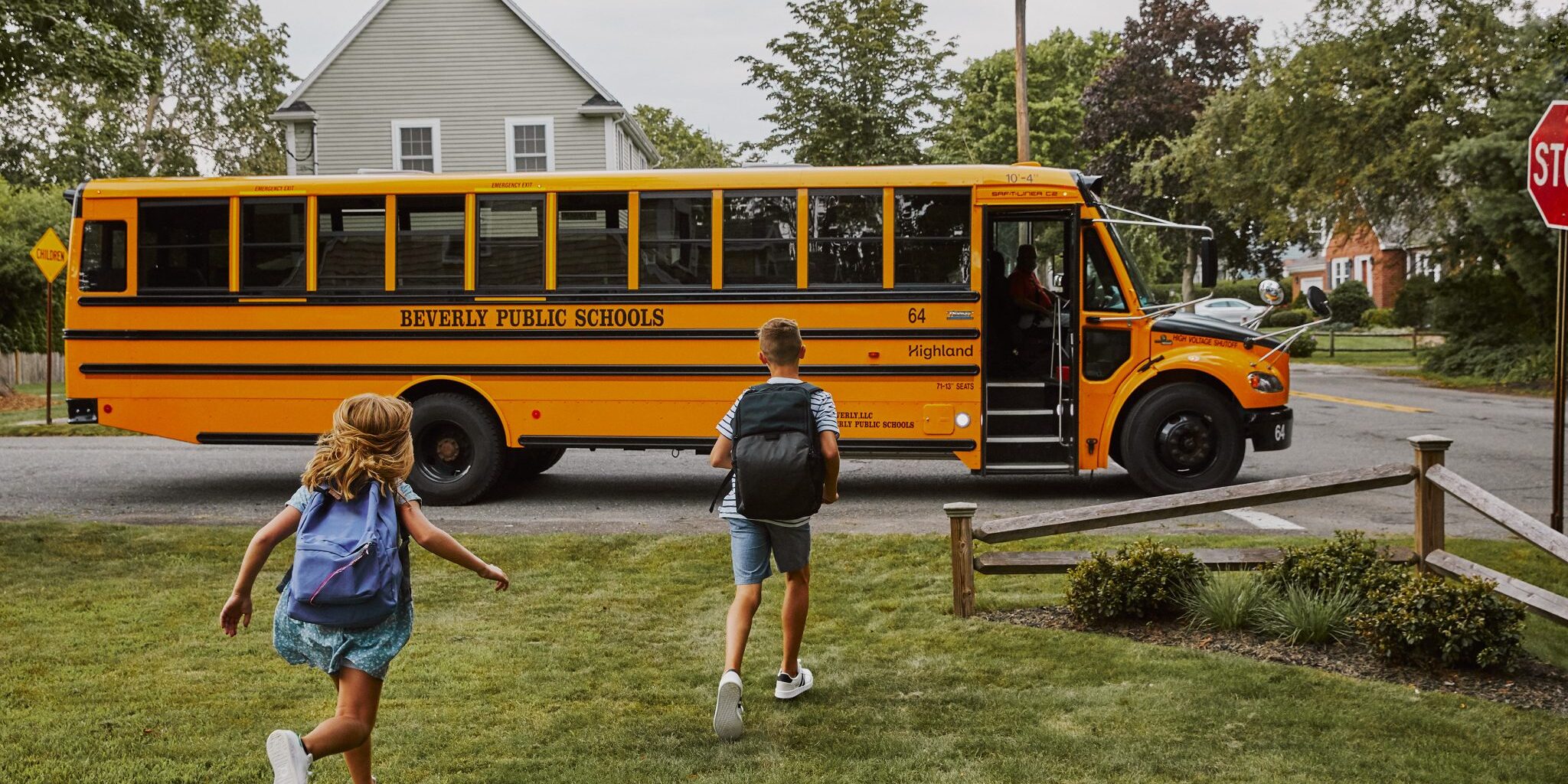
What’s better than working toward a zero-carbon energy transition? Working toward a zero-carbon energy transition that engages educators, students, and other community members.
The U.S. electricity grid is a large, complicated system. Sometimes a future where we no longer use fussil fuels or emit huge amounts of greenhouse gases seems out of reach. But that's not true: change is challenging, but possible. An electric school bus pilot in Beverly offers a glimpse of a community ensuring a cleaner, more equitable grid by making infrastructure changes while incorporating essential community engagement.
In 2020, MAPC partnered with the City of Beverly and Highland Electric Fleets, a company whose mission is dedicated to working with communities and transportation stakeholders, to create a seamless and affordable transition from diesel school buses to electric buses. An accelerating Transportation Now (ACTNow) grant from the Massachusetts Clean Energy Center (MassCEC) enabled the team to deploy a second battery electric school bus in Beverly, conduct engagement with students and teachers, and test out a third-party financing model that could be replicated in other cities and towns. (MAPC is also researching regional procurement models that could help municipalities obtain and maintain battery electric school buses while reducing their associated costs!)
Making the transition from diesel to electric school buses has many benefits. Beverly’s new electric school bus reduces the community’s greenhouse gas emissions and improves local air quality due to the decrease in diesel pollutants. The electric bus can also discharge its battery back into the electric grid during times of high electricity demand, which provides more stability to the grid and can serve as a revenue source for the bus owner.
The program also provided a chance to engage teachers and students on the clean energy transition. As part of the ACTNow grant, EcoRise, a non-profit organization that creates school programs and sustainability-based curricula to promote hands-on learning in schools, held a training for Beverly Public School STEM teachers in November 2021. Building on their EVs for Schools students program in Austin, Texas, EcoRise developed a curriculum to help Beverly educators teach students about energy and sustainability.
A Deep Dive on the Beverly Public School Training
It was early morning, with the halls of Beverly Middle School uncharacteristically empty of students, when 19 Beverly Public School teachers began their electric vehicle training. Engaged and excited teachers wrote and drew on the tops of tables designed to serve as whiteboards. (Markers were plentiful!) Written ideas intermingled both physically and organically. Two or three teachers at the training happened to have electric cars, so they were able to speak about the benefits and challenges of owning and driving EVs. Training facilitators and teachers engaged with one another throughout the day.
A comprehensive discussion of climate change kicked off the program, including the state of the crisis today and its impact on Massachusetts communities, before teachers discussed ways to raise awareness about the issue with their students. Next, two Highland Electric employees joined the training to present about the company’s electric school bus partnership.
One exciting concept for many teachers was the bus's vehicle to grid (V2G) function, during which electricity from the battery is sent back into the power grid when it is not in use. Equally surprising to the audience was an anecdote one speaker had heard: because the electric bus runs smoother and quieter than its diesel counterpart, the students tend to be less loud and rambunctious on their rides to and from school.
Later, the group made their way to the school bus depot, an open-air parking lot next to Beverly Middle School. There, teachers saw the inside of the charging station while the Highland Electric team discussed the capabilities of electric vehicle (EV) infrastructure. The team also touched on the challenges that come with transitioning to electric vehicles, such as the need to add over 2 million electric charging stations to our evolving national network by 2030.
After the field trip to see the charging equipment, the training returned to the classroom, where teachers reflected on how they could start an EV-based discussion in their classes. Teachers could ask what students know about electric vehicles, what they wonder about the topic, and what they have learned. Before accessing EcoRise curriculum on an online platform, the EcoRise training team led the faculty through their curriculum design process, intended to encourage students to raise up and present their innovative ideas: to “identify, explore, create, refine, and share.”
Teaching Students: About the Curriculum
The lessons provided by EcoRise are developed to teach students about energy and transportation, electric vehicles, charging stations, equity considerations, and the costs associated with this equipment, among other topics. See the box below for a more in-depth view of the curriculum.
Exposing community members and stakeholders to the clean energy transportation industry, especially teachers and students, can help make the energy transition more accessible and understandable for our communities. A dedicated training program and curriculum helps them gain the skills needed to understand electric vehicles and their relationship with the electric grid, among other important topics.
As the training demonstrated, the electric school bus and charging infrastructure can become a living laboratory outside of the classroom, and a lesson can turn into a hands-on experience for teachers and students. The energy transition is an opportunity to bring more hands-on learning to schools, increase community engagement and expose more individuals to clean energy. To learn more about the project, check out the following video about the electric school bus in Beverly:
To learn more about electric school buses in general, explore the World Resources Institute’s Electric School Bus Initiative.
To learn more about upcoming funding opportunities related to electric buses, be on the lookout for:
- Clean School Bus Funding (EPA) & Program Fact Sheet
- Accelerating Clean Transportation School Bus (ACT Bus) (MassCEC)
If you have any questions about the project, contact Jesse Way, MAPC Clean Energy Specialist II, at [email protected].
